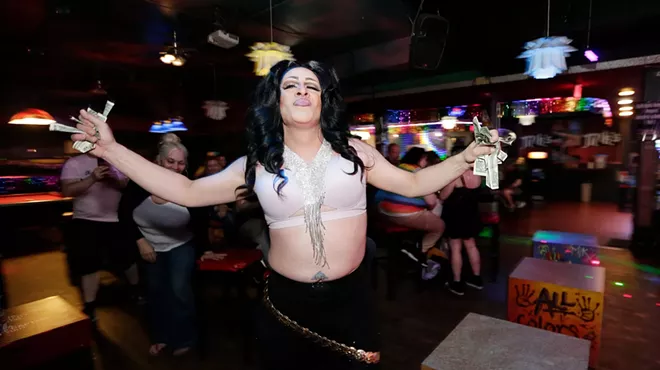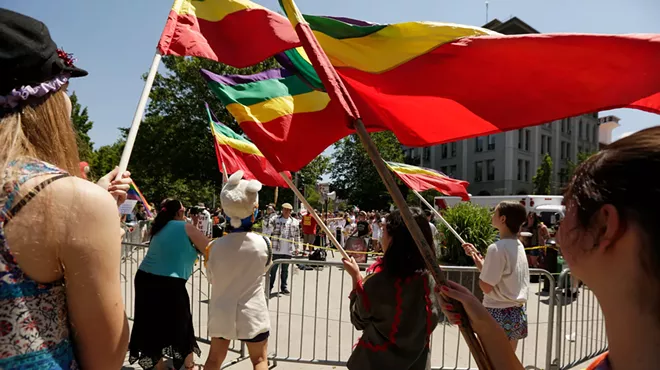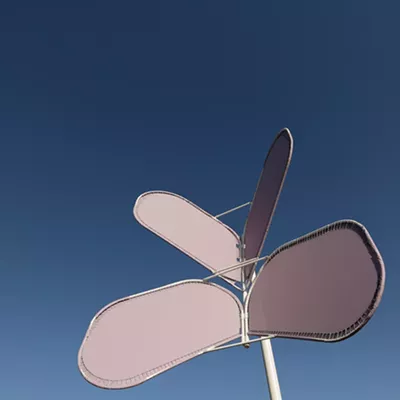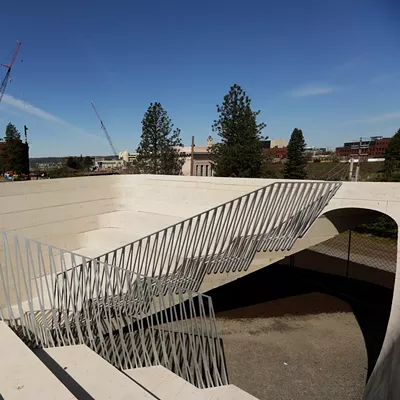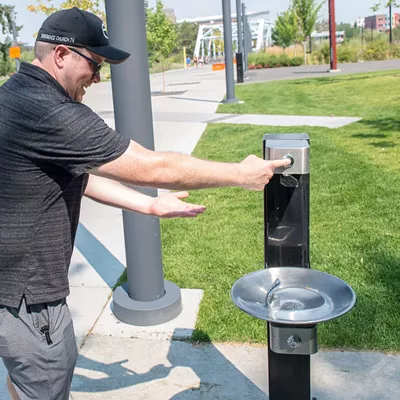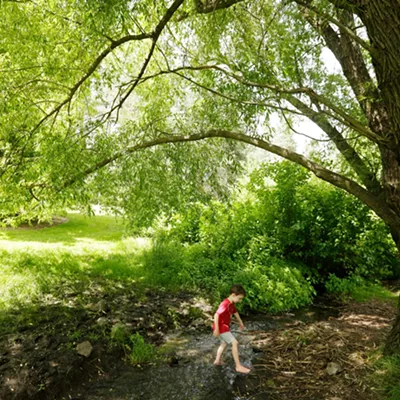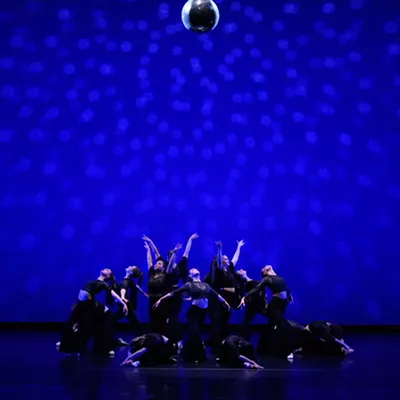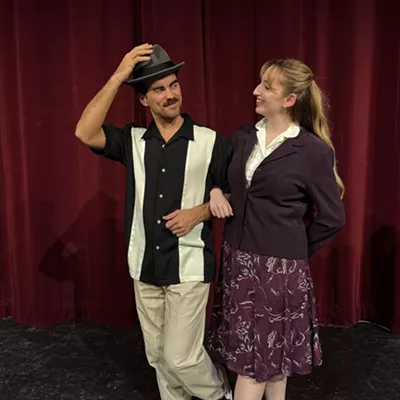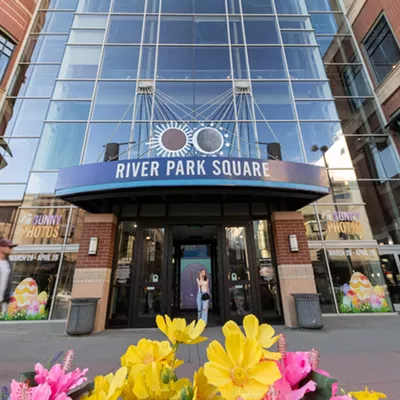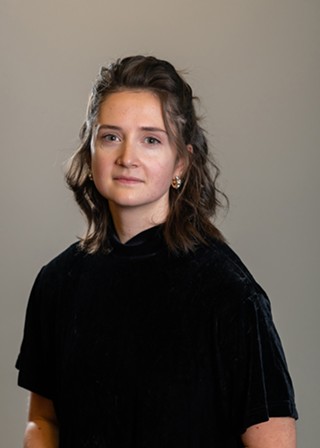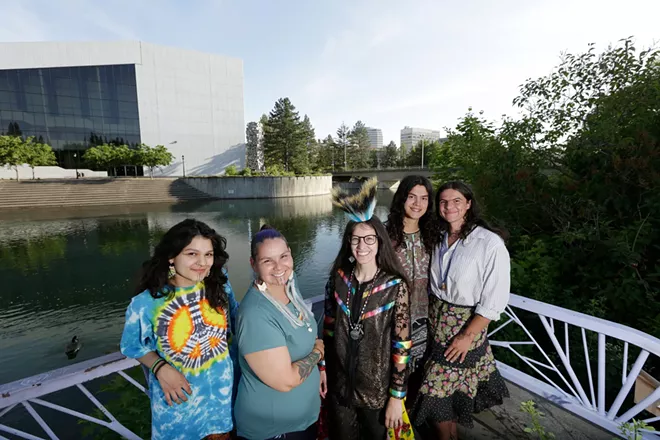
When Alexis G. Tonasket Hoyt started learning their tribe's language, they felt they finally found what they'd been "pulled towards" their entire life.
Tonasket Hoyt is half Irish, half Native, and a member of the Confederated Tribes of the Colville Reservation. As soon as they started studying Okanagan Salish, they learned that their language had more than two options for pronouns.
"It felt so liberating," they say, "because it was naming parts of me that have always been there, but I didn't have words for it yet."
Tonasket Hoyt is a Two-Spirit person. Two-Spirit is a pan-Indigenous term that refers to someone who contains both male and female spirits.
This Friday, Spectrum Center Spokane is holding the city's first Spokane Falls Two-Spirit Powwow in Riverfront Park, a ceremony honoring Two-Spirit and Indigiqueer people who are often excluded from male- or female-only powwow dances. As part of Spokane Pride, the powwow kicks off a weekend of celebration. A Two-Spirit person is also leading the Spokane Pride parade on Saturday.
Roo Qallaq Ramos, who is Iñupiaq and a member of the traditional village of Kiana in Alaska, is Spectrum's executive director. They have wanted to host a Two-Spirit powwow for years. Growing up as a Two-Spirit in Spokane, Ramos felt unable to fully express themselves with both non-Indigenous and Indigenous people. Despite an inclusive pronoun system, tribal cultures aren't always welcoming to nonbinary people.
"Our communities are decimated from our cultural norms that we had before colonization," Ramos says. "The first one to be impacted by that is, of course, trans identities or Two-Spirit identities."
Colonial influences changed the way many Indigenous people thought, Ramos says. Christian values narrowed their worldview into a strict binary. But traditionally, Two-Spirit people had special roles and responsibilities in their communities. With their unique understanding of both genders, Ramos says Two-Spirits were often tasked with healing or decision-making for their communities.
When they joined Spectrum, one of Ramos' goals was "to create a program and space for Two-Spirits to exist" that they didn't have growing up.
The powwow, Ramos says, will be "an indication to the Indigenous communities that we are going to stand here and we're going to be recognized and we are no longer going to be forgotten or left out."
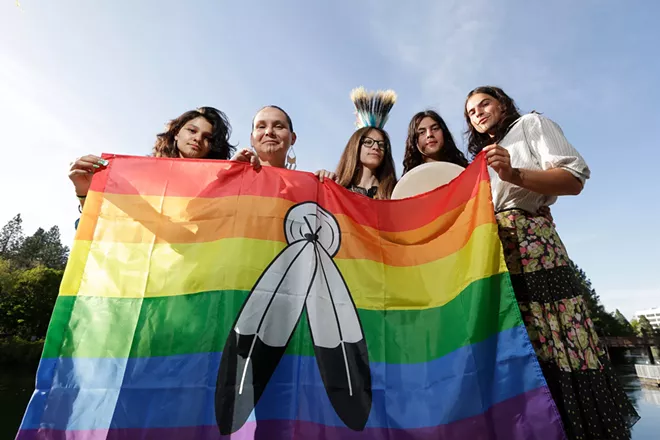
Powwows are typically divided into male and female categories, with specific dances and regalia for each. This makes it difficult for Two-Spirit people to feel welcomed and included.
In 2012, the Bay Area American Indian Two-Spirits organization held the first ever Two-Spirit powwow, where Two-Spirit people could perform in whatever dance and attire they preferred. Since then, this type of powwow has been growing in popularity all over the country.
"I think it's just time," Tonasket Hoyt says. "It seems like there's a lot of shift happening right now with our culture — people like me who are stepping in and reconnecting and reclaiming and coming out and using these words for ourselves."
Spokane's Two-Spirit powwow will have a grand entry at 1 pm, followed by various dances, a dinner and a royal pageant. While some performances are reserved for performers in full regalia, other inter-tribal dances will be open to everyone. Two masters of ceremony, Dustina Edmo Abrahamson and Drea Rose, will guide attendees through the event so everyone knows how to participate respectfully.
The emcees will also help attendees understand the history and significance of what they're witnessing. Abrahamson holds a master's degree in Indigenous nation studies and has traveled all over the world to work with Indigenous peoples. But her education started as a young girl dancing in powwows across the U.S. with her family every summer.
"I've been dancing since I could walk," Abrahamson says. "I love sharing the history or the background of the dance itself that comes out."
Powwows are by nature a cross-cultural exchange, Abrahamson says. Historically, they brought different tribes together for trade, feasting and spiritual ceremonies. Today, powwows are also welcoming to non-Indigenous people who want to learn and join the celebration.
"So that's the beauty of powwows," Abrahamson says. "How everybody, all these different tribes and cultures, have shared, and how we celebrate who we are today in what we wear and how we dance."
Spokane's Two-Spirit powwow has other distinctions. Instead of competing for a top monetary prize, all dancers and drummers are being paid equally. Having a female emcee is also a unique feature, Abrahamson says.
The royalty pageant, an event typically held for women, is now open to any performer.
Ramos hopes that whoever is crowned is able to travel to other powwows this summer, spreading awareness of Two-Spirits and asking powwows to loosen some of their gendered boundaries.
"In order for our cultures to continue, that means that our relationships need to continue," Tonasket Hoyt says.
"Our relationships with each other, within our own tribes [and] intertribal, our relationships with the land, our relationships with the water and the salmon — they're all connected. By having a two-spirit powwow, we are re-inviting the Two-Spirit people into the community circle." ♦
Spokane Falls Two-Spirit Powwow Fri, June 9 from 1-9 pm, Lilac Bowl in Riverfront Park, linktr.ee/SpokaneFalls2sPowwow



